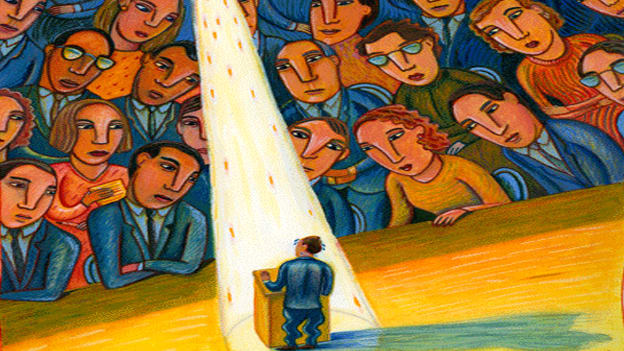Death by Public Speaking

I was all of 12 years. And I had been given the death sentence.
I remember the day so clearly. Sweaty palms. A dry mouth. The morning’s breakfast threatening to make an appearance any second. I was envious of every person present there that day. They were free. They could enjoy the proceedings of the day, as I waited for my inevitable execution. Minutes crawled. Droplets of sweat trickled down my spine.
Even recounting the day today, from almost two decades ago, gives me a sick feeling in my stomach. The day that I had been asked to make a speech at the local Police Station’s annual-day celebrations.
Finding this a tad dramatic? You wouldn’t, once you take a look at the following statistics.
- Research suggests, quite unequivocally, that 3 out of 4 people suffer from a fear of public speaking, also called Glossophobia. Extroverts included.
- Symptoms of Glossophobia begin to appear in kids around the age of 13.
- Men and women are impacted alike by this social affliction.
- People rate public speaking as their number one fear. Death is rated second. Yes, that’s right. Death is second.
Having established, that a whopping 75% of people on the planet suffer from stage fright, let us take a closer look at why is it that we’d rather die than attempt to speak in public.
Why do we have butterflies?
For a minute, let’s picture a public speaking scene that all of us are familiar with. So you get onto that stage, amidst the sea of unfamiliar faces. Everyone in the room looks all set for your presentation. The conference room seems deathly still all of a sudden with all eyes trained on you. You clear your throat to speak. And just like that - your mind goes blank. And before you know it, your body’s taken over. And the weapon at its disposal? Adrenaline. Loads of it. And what does that do to you? A racing heart. Sweaty palms. Butterflies. The works. And the rest is history. Which repeats itself.
Let’s explore the science of stage fright a little bit. Once we are able to chalk down our heart-attack like symptoms to just a few primitive reactions getting triggered in our body, it would make them a lot easier to deal with.
We all know that Homo sapiens, you and I, have a strong instinct for survival. Here’s a little-known fact. We also have an equally strong instinct to have others see us in a good light and will try to protect our reputation, no matter what the cost. In fact, this need to avoid being seen as a loser, a failure or bad at something, is so primal that it’s tied very closely to the body’s fight or flight response. Which means that we are powerless in the face of any perceived threats to our reputation, and whether we like it or not, our body takes charge of the situation, sometimes even against our will.
Leadership woes?
More often than not, leadership is perceived to be more about how charismatic an orator a leader is, and how well he performs in front of a crowd, than how brilliant he is at handling large teams and motivating them towards success. And this is the reason why many leaders, quite successful at leading teams, shy away from the title, as they are deathly scared of failing at public speaking.
Is there light at the end of that mike?
Are we doomed then, to bracing ourselves for mini-heart attacks every time we hold a mike? Or do we give in to our bodies and bid goodbye to public speaking?
Not quite! Experts say, that there are ways that we can use to get a grip on this seemingly uncontrollable phenomenon. And no, I am not going to rattle off the clichéd and much talked about solutions of breathing slowly or using visualization techniques.
Here’s how we can attempt to tame this monster, with 7 techniques that REALLY work.
Know that you’re not alone. Everyone (well, almost) hates the spotlight. Find solace in the fact that three out of four people in that audience you face, suffer from speech anxiety, making you no different from them. So relax.
Befriend the adrenaline. Make it your ally. The moment when you stand up to speak and feel the adrenaline kicking in, naming it as nervousness, will only ensure the body complies with your thoughts. You feel something miserable is about to happen and are overwhelmed by a sense of doom. How about calling it enthusiasm and excitement instead? A feeling you relate with being ready and looking forward to something. Use the adrenaline to your advantage and see your nervous energy getting channelized into a passion for what you’re speaking about.
Get off your ‘What If’ horse. What if my presentation is awful? What if I look bad in front of everyone? What if I forget my lines? If you train your mind to think you’ll fail, you certainly will. Or better yet, how about changing your horse to a different one? How about saying –What if the audience loves what I have to say? Or What if I am really able to make an impact on their minds?
Let total familiarity with the content bring you comfort. Practice your talk as if your life depended on it! Counter the discomfort that being in the spotlight brings, with the comforting familiarity of a content you’ve rehearsed hundreds of times. As Mark Twain said, ‘It usually takes me more than three weeks to prepare a good impromptu speech.’
Don’t kill with PowerPoint. Don’t choke your slides with long paragraphs, each a thousand words long. PowerPoint is an aid. Use it like one. And remember, your audience can only focus on one thing at a time. What you speak OR what your slide reads. You don’t want your slides competing with you for the audience’s attention, do you?
Care about your subject. Passion for what you’re saying makes up for any flaw that your talk may have. Nothing beats feeling for what you’re talking about. In fact, it’s by far the best-known antidote for speech anxiety.
Volunteer to speak more. In the words of Elbert Hubbard, the famous philosopher, writer and public speaker, “The only way to learn to speak is to speak and speak, and speak and speak, and speak and speak and speak.”
There is a good reason why Glossophobia ranks the highest among all social fears. But we also know that if we are to succeed at work, presenting our ideas to others is inevitable and getting onto the stage is more a matter of ‘when’ than ‘if’.
The question that remains then is – do we let our mind trick us into believing that we’ve got to run for our lives every time we face a crowd, or can we trick it into believing that we are actually looking forward to it.
Speech Anxiety. Let’s conquer it - one great speech at a time. See you on stage then?













